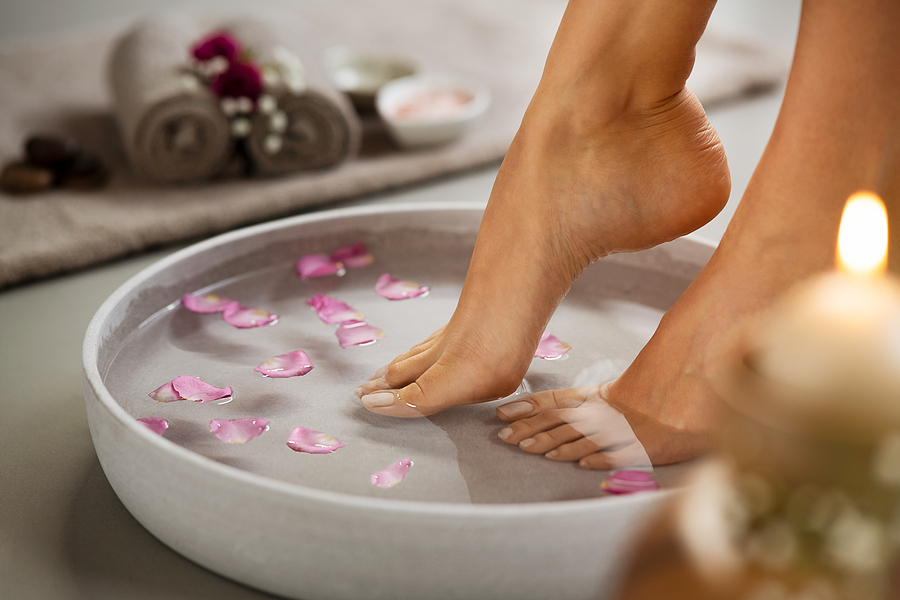How to have happy feet
It doesn’t take much to take care of our feet and they can feel, look and perform so much better if only we didn’t take them for granted.
The first thing to consider is our footwear, particularly for women.
Podiatrists say the regular wearing of high-heeled shoes will lead to difficulties with your feet. High heels for the occasional night out or short periods will not cause much harm, however, it is the constant wearing that may result in problems.
Achilles problems
The Achilles is the large tendon at the back of the ankle which connects the calf muscles to the heel bone. Constantly wearing high heels can result in the shortening of the Achilles tendon and Achilles tendonitis, which is the inflammation of the tendon, can occur if you suddenly change to flat shoes from high heels. This may even result in a rupture of the tendon and surgery may be required.
This condition may be avoided by reducing your heel height little by little until it is approximately half an inch. Flats (slip-on shoes, like court shoes) are not suitable as in order for them to stay on your feet they have to be quite tight and do not provide any support for the foot.
What should we wear?
Ideally, we should all be wearing a soft leather, lace-up shoe with a cushioned insole and rounded front. Shoes such as good trainers are ideal.
A few stretching tips
To keep the range of movement and your foot supple it may help to stretch your calf muscle as this will lengthen your Achilles tendon
Another exercise is to lean against a wall with one foot slightly forward and the other leg stretched out behind you. Ease your heel down gently and feel the stretch. Then change over legs. It’s good to do this several times.
Taking care of our feet
Wash your feet regularly and pay particular attention to drying them too. Make sure to dry in between your toes, as this is where infections can develop if they are left damp. If you give your feet some time to breathe it’ll help to control odours too.
Getting rid of dry skin on your feet can help them feel soft and supple. Pumice is a natural material sold in small blocks, and it’s perfect for helping flake away dead skin cells. Try using them every one to two weeks, depending on how dry your feet are.
Using a scrub while washing your feet is useful to help remove dead cells and also great for stimulating your nerve endings and making your feet feel more lively.
It is important to cut toenails straight across or follow the toe shape. Try not to cut down the sides as this could leave a sharp and jagged nail which could cause an infection by growing into the skin.
Wearing flip-flops or sandals can result in cracked skin around the heel. Regularly applying a urea-based cream or one with urea and lactic acid can help.
When to see a specialist
There are some problems that you will need expert help with and so should visit a podiatrist or chiropodist. One of these is foot pronation. This is when the foot rolls too far inwards when we walk (flat-footed). Excessive pronation can cause shin splints.
Orthotics are the main treatment for problems with excess pronation. There are various types of orthotics, some provide extra cushioning and relieve pressure, helping to prevent hard skin and corns. Others are more rigid and are designed to reduce pain by helping the muscles connected to your foot to work. You should speak with a podiatrist about the type that is right for you.
Feet and diabetes
Good foot care is essential if you are suffering from diabetes. It is important to check your feet every day. If there is any loss of feeling or if you have any other concerns then you must make an appointment to see your GP. If you do have diabetes then an annual foot check is essential.
Disclaimer
All content on Silversurfers.com is provided for general information only, and should not be treated at all as a substitute for the medical advice of your own doctor or any other health care professional. Silversurfers will not be responsible or liable for any diagnosis made by a user based on the content on www.silversurfers.com and we are also not liable for the content of any external websites or links from or to Silversurfers to any other websites. Please always consult your own doctor if you’re in any way concerned about any aspect of your health.
Melina - Assistant Editor
Latest posts by Melina - Assistant Editor (see all)
- Remembering the Big Freeze of 1963 - November 21, 2024
- Is your hot water bottle safe to use? Tips on what to look out for - November 20, 2024
- Tips on dealing with a frozen windscreen without using a spray de-icer - November 19, 2024
- 5 Homemade edible gifts in a jar - November 15, 2024
- The best of the Rolling Stones - October 22, 2024





















